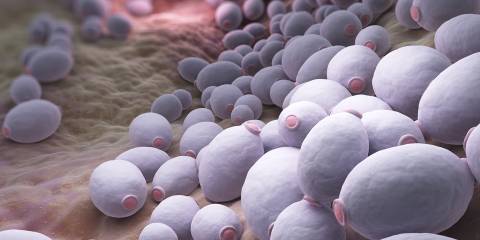Inflammatory bowel disease, most commonly manifesting as ulcerative colitis and Crohn's disease, affects about 1 million Americans.
It is one family of over a hundred autoimmune illnesses, in which the body's defense forces (immune system) mistakenly attacks the body — in this case the small or large intestines.
Symptoms
- Persistent diarrhea
- Crampy abdominal pain
- Fever
- Intermittent rectal bleeding
It is the latter 2 symptoms that distinguish inflammatory bowel disease from the more common (and more benign) spastic colon and irritable bowel syndrome — which can be easy to treat holistically.
Although Crohn's disease most commonly affects the end of the small intestine (the ileum) and the beginning of the large intestine (the colon), it may involve any part of your intestines.
In ulcerative colitis, on the other hand, bowel involvement is limited to the colon.
Diagnosis
Most often your physician will diagnose the problem by doing a colonoscopy (looking up your bottom with a long flexible tube) and biopsies.
Blood tests can also help distinguish between Crohn's and ulcerative colitis.
Treatment
Natural therapies can be very effective to both treat the cause of the inflammation and the inflammation itself.
-
Recommended Supplements
Nutritional deficiencies are widespread in Crohn's and ulcerative colitis.
-
Zinc
Low zinc has been associated with markedly increased complications from inflammatory bowel disease (called "fistula" where the inflammation drains to the skin or other organs, and “leaky gut” causes food allergies). Take an extra 25-30 mg of zinc a day for 3 months and then at least 15 mg a day.
-
Vitamin D
A recent study showed vitamin D deficiency (which is associated with many autoimmune illnesses) plays a role in Crohn's. Take 2,000-4,000 units a day for at least 6 months.
-
Multi-Nutrient Powder
You can try a good multi-nutrient powder to get the necessary zinc and vitamin D (such as the Energy Revitalization System powder), which also would supply excellent overall nutritional support. However, a powder supplement may aggravate loose stools. If this happens, substitute the product Natrol My Favorite Multiple — Take One. Although nothing like the powder, it gives excellent overall support for a single tablet each day.
-
Boswellia
The herb boswellia 1,000 mg plus a day is VERY helpful for inflammatory bowel disease in general. It is cheap, safe and well tolerated — and is as effective, or more so, for colitis than many of the medications. Use an herbal mix that contains curcumin 1-2 a day.
-
Fish Oil
Fish oil is a good general anti-inflammatory, so eat salmon or tuna 3-4 times a week (or more) or use a special omega 3 supplement.
-
-
Other Therapies & Advice
-
Treat for Bowel Infections
Treat for yeast infections with Diflucan 200 mg a day for 6 weeks (plus probiotics — consider the super high potency VSL#3 for a month, then probiotic pearls or Pearls Elite 1 daily ongoing for 5 months, then every other day). This is reasonable for anyone with inflammatory bowel disease — no matter whether or not fungal cultures are positive.
Get a Stool Test
Do stool testing first at Genova labs or DiagnosTechs (by mail — do the bacterial and fungal cultures and sensitivities and parasite testing). If the parasite or bacterial infection tests are positive, treat these based on the results. If negative, a trial of prescription Albenza may be reasonable.
Doing stool cultures or parasite testing at most labs is a waste of time unless you are looking for an acute infection (e.g., salmonella food poisoning). Remember, that we don't have good testing for bowel infections does not mean that they are not causing your problems!
-
Treat Food Allergies
Doing a "Multiple Food Elimination Diet" after the bowel infections and nutritional deficiencies are treated would be a good screen for the role of food allergies. Though the food allergies may not be causing the inflammation, the inflammation will result in "leaky gut" and secondary food allergies which may then cause more problems. Eliminate the food allergies with NAET.
-
-
Medications
By using the natural treatments discussed above, you may avoid the need for both the cost and toxicity of these medications — by staying healthy!
-
Natural Cortisol
Though high dose prednisone (over 5 mg a day) is toxic over time, the bioidentical cortisol (Cortef by prescription) up to 20 mg a day (similar to 4 mg of prednisone but safer) can be used safely long term. Once your prednisone dose is lowered to 5 mg a day, ask your physician if you can switch to Cortef 5-20 mg each morning.
-
Asacol and Antibiotics
Your doctor might recommend Asacol (salicylates) and occasionally antibiotics, which are good medications for these illnesses and not very expensive.
-
Remicade
Your doctor might also recommend "biological modifiers" like Remicade — although possibly too quickly.
This can cost over $2,000-$5,000 per injection (often netting a tidy profit for the doctor) and only works for about 2 months and then needs repeating.
By 1 year it is only still effective in about 20% of cases.
They are very heavily marketed to physicians because they are so profitable for both the company and the doctor.
I recommend keeping these in reserve as "rescue therapies" to be saved for when all else fails (it's better than surgery, which is sometimes needed).
-
More Information Online
- Natural Therapy for Ulcerative Colitis and Crohn's - Inflammatory Bowel Diseases
- Boswellia for Colitis
- Multiple Food Elimination Diet
- NAET (acupressure technique for treating food allergies at www.NAET.com)




